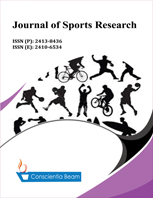The Influence of Strength and Power on Rowing, Ski Ergometer Performance
DOI:
https://doi.org/10.18488/journal.90.2019.61.29.32Abstract
Ergometers have been developed as off-season or dryland training tools for sports such as rowing and cross-country skiing. These ergometers have recently been staples in the training methods for functional fitness athletes. Purpose: To examine the relationship between athlete strength and power with rowing ergometer and ski ergometer performance. Methods: Eight healthy college-aged participants, age 18-26 years volunteered to go through a series of strength and ergometric exercises while being assessed with a metabolic cart to measure gas exchange. The three strength measures were a maximal effort on bench press, back squat, and deadlift. A watt bike was also used to assess lower body power output. All strength tests were performed following the National Strength and Conditioning Association protocols. The ergometric performances on ski ergometer and rower were performed both using the Concept2 model with the damper settings at 10. Results: A significant relationship exists between strength and ergometer performance at both sprint and mid-distances. Conclusions: Athlete strength is a significant contributor to ski ergometer and rowing ergometer performance at 100-meter and 2000-meter performances. When considering training protocols for rowing and cross-country skiing, athletes and coaches should invest in addressing strength as a meaningful portion of the training effort.

